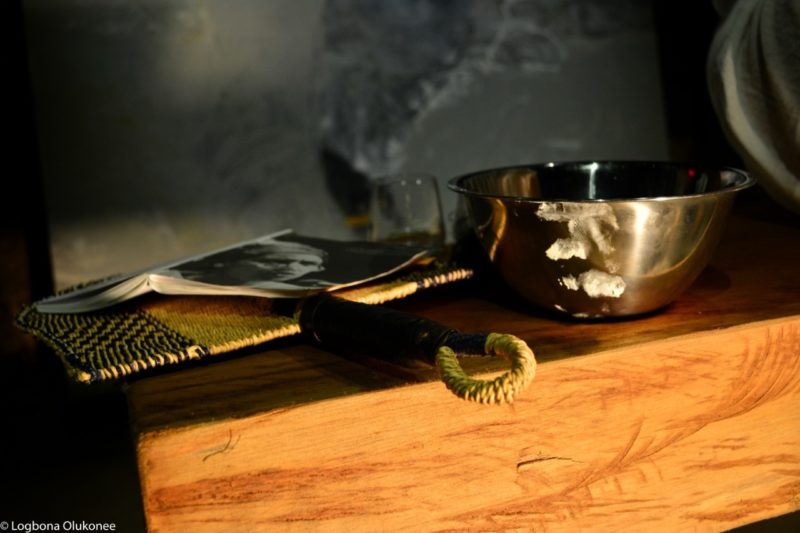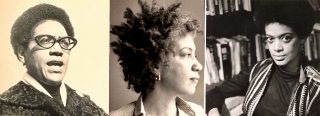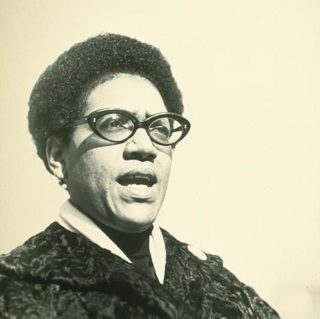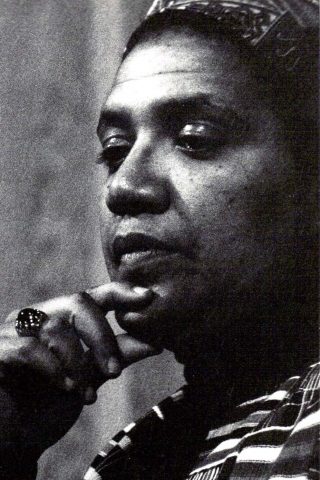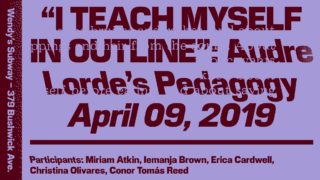[español abajo]
Dear Audre:
I am writing you from an Afro-dystopian period. Right now, a pandemic is killing Black communities in the United States, and a similar fate can be seen for many of the Black and indigenous peoples in America.
From here I write to thank you.
I am a migrant, Afro-Cuban non-binary trans-masculine boy, living very close to the Southern Border of Mexico. Above all, I am the son of Olukun and listen to the waves of Yemayá every day, despite living in a valley surrounded by mountains.
Maferefum for you, your ancestors, and Yemayá every day.
I would love to tell you how I got to know your work. A queer Latina student from the Latin American School of Medicine lent me Sister Outsider and Zami more than ten years ago in Havana. English did not stop me: I picked up an old dictionary and read both books very patiently. I remember reading some articles more than three times, in order to understand each sentence well. At that time, I worked in the Department of Marxism and History at the Agrarian University of Havana, in Mayabeque. While my coworkers discussed in the department meetings strategies for students to commit to a political project that for me is a dictatorship, I read Zami. Imagine that!
From that moment on, I have read your work periodically, as a political and emotional survival drive, mainly in my transition processes, from a Cuban “citizen” to a migrant student on the southeast Mexican border; from woman to queer person to non-binary transmasculine boy; the transits between activism and the academy, continually negotiating my presence in the spaces of feminist activism in Mexico and in the Chiapas academy, which maintains the intact colonial essence of the western academy.
Your reflections on the political value of survival, eroticism and spirituality helped me develop a muscle of survival strategies that are always being exercised and renewed in a genocidal anti-black and anti-trans liminal space such as this border. I perceived that these categories are deeply interwoven: survival-eroticism-spirituality, forming a powerful articulation, that they are an example of anti-colonial resistance technologies and they escape from Western logic (Christian, 1987) that is, from binary / cis / heterosexual logic / white. These and other non-western practices are part of submerged black queer epistemologies (Tinsley, 2018) that we are spinning diasporically.
They are like dandelions: resilient, easy to find, difficult to remove, created by our ancestors for us. But it is not exclusive to cis bodies. A fundamental part of exercising this muscle consisted of expanding the political meaning of the joint: survival-eroticism-spirituality for those who transcend the gender binary.
Afro-diasporic thinkers have shown us how gender is a colonialist fantasy. Hortense Spillers (1987) explained how during slavery black bodies became a territory of cultural and political manipulation. Generic meanings and uses were imposed on them according to the interests of the slavers. bell hooks argued that given “the persistent masculinization of black women, we should all be understood as queer and trans” and Afro-Brazilian teacher Dora Santana advocated more practice of “black trans-cis-terhood” (Tinsley, p.33). Young Afrotransfeminist intellectuals and academics are emphasizing black genres as queer, as trans (Gossett, 2016; Snorton, 2017; Ellison, 2017).
They helped me to reflect joyfully on the queer and trans paths of our Orishas like Yemayá Olokun; enjoying the pleasure of fully existing while dancing and moving my fat-black-hairy-trans body to the beat of the Afro-Caribbean rhythms. They are part of my daily healing ceremonies, when talking to nature, the ancestors, the orishas, asking them for guidance and protection. They clean my way; they provide transparency when the clouds of white / mestizo / cis morality try to make me feel guilty, responsible or insufficient for not responding from the canons of the policies of the respectability of the middle class. They help me to put limits, mainly on white and cis fragility, to take care of my energy and my resources. Well, you already wrote it: "taking care of myself is not an act of self-indulgence, it is self-preservation, and this is an act of political war" (1988).
I am sorry to tell you that after more than forty years of your essay "The master's tools will never dismantle the master's house" where you clearly exposed the different oppressions that black women lived in the academy, that space has not changed much. The academic discourses of social liberation and their concrete materiality confused me for a long time, and I was not alert or emotionally and spiritually protected before the innumerable experiences of institutional racism, tokenization, epistemic extractivism, trans-hatred that I lived within the Mexican academy.
As I reread your work I realized the need to heal these forms of violence, and, in 2018, I developed a workshop that has gone by various names, the one I liked the most was Afroperreo and Fat Activism. Taking into account that survival is "learning to make common cause with others who are also outside the system, and, among all, define and fight for a world in which we can all flourish," (1984) I decided to do it with my companions and thus heal joints.
And it is that I love to dance. It is like meditating. All the problems go away while I dance and I feel so beautiful.
The intention of the workshop has been to reflect on the stereotypes that exist about the bodies of women, trans and non-binary subjects prietxs in America. Through the possibilities offered by the erotic-spiritual along with reggaeton, dancehall, calypso and rumba, we explore the forms of resistance / rupture of colonial discourses on racialized bodies. On several occasions, the workshops mentioned how they were able to move parts of their bodies that were asleep or that they did not know they had.
For all those tools that you bequeathed to black people, thank you. Thank you, for creating a path that we have continued to expand, thinking and imagining other tools rooted in our queer and trans black epistemologies.
--Tito Mitjans Alayón
San Cristóbal de las Casas, Chiapas, April 2020.
Carta a Audre Lorde desde el futuro
Querida Audre:
Te escribo desde un período afrodistópico. En estos momentos una pandemia está matando a las comunidades negras en Estados Unidos y se puede ver un destino similar para muchos de los pueblos negros e indígenas en Améfrica.
Desde aquí te escribo para agradecerte.
Soy un chico transmasculino no binario afrocubano, migrante, viviendo muy cerca de la Frontera Sur de México. Sobre todo soy hijo de Olukun y escucho las olas de Yemayá todos los días a pesar de vivir en valle rodeado de montañas.
Maferefum para ti, tus ancestras y Yemayá todos los días.
Me encantaría contarte como conocí tu trabajo. Una estudiante latina queer de la Escuela Latinoamericana de Medicina me prestó La Hermana la Extranjera y Zami hace más de diez años en la Habana. El inglés no me detuvo, tomé un diccionario viejo y leí ambos libros con mucha paciencia. Recuerdo leer algunos artículos más de tres veces, para poder entender bien cada oración. En aquel momento trabajaba en Departamento de Marxismo e Historia de la Universidad Agraria de la Habana, en Mayabeque. Mientras mis compañeros de trabajo discutían en las reuniones del departamento estrategias para que los estudiantes se comprometieran con un proyecto político que para mi es una dictadura, yo leía Zami. ¡Imagínate!
A partir de ese momento he leído tu obra periódicamente, como una pulsión de sobrevivencia política y emocional, principalmente en mis de procesos de tránsitos, de “ciudadano” cubano a estudiante migrante en la frontera sureste mexicana; de mujer a persona queer a chico transmasculino no binario; los tránsitos entre el activismo y la academia, negociando continuamente mi presencia en los espacios de activismo feminista en México y en la academia chiapaneca, que mantiene la esencia colonial intacta de la academia occidental.
Tus reflexiones acerca del valor político de la sobrevivencia, lo erotismo y lo espiritual me ayudaron a desarrollar un musculo de estrategias de sobrevivencia que siempre están ejercitándose y renovándose en un espacio liminal genocida antinegro y anti-trans como es esta frontera. Percibí que dichas categorías están profundamente entretejidas: sobrevivencia-erotismo-espiritual, formando una poderosa articulación, que son un ejemplo de tecnologías resistencias anticoloniales y se escabullen de la lógica occidental (Christian, 1987) o sea, de la lógica binaria/cis/heterosexual/blanca. Estas y otras prácticas no occidentales son parte de epistemologias negrxs queers sumergidas (Tinsley, 2018) que estamos hilando diaspóricamente.
Son como el diente de león, resilientes, fáciles de encontrar, difíciles de eliminar; creadas por nuestrxs ancestrxs para nosotrxs. Pero no es exclusivo de los cuerpos cis. Una parte fundamental de ejercitar dicho musculo consistió en expandir el significado político de la articulación: sobrevivencia-erotismo-espiritualidad para quienes trascendemos el género binario.
Pensadoras afrodiaspóricas nos mostraron como el género es una fantasía colonialista. Hortense Spillers (1987) explicó cómo durante la esclavitud los cuerpos negros se convirtieron en un territorio de manipulación cultural y política. Se le impusieron significados y usos genéricos según los intereses de los esclavistas. bell hooks expuso que dado “la persistente masculinización de las mujeres negras, todas deberíamos ser entendidas como queer y trans” y la profesora afrobrasileña Dora Santana abogó por practicar más la “black trans-cis-terhood” (Tinsley, p.33). Varixs jóvenes intelectuales y académicxs afrotransfeministas están enfatizando los géneros negros son queer, son trans (Gossett, 2016; Snorton, 2017; Ellison, 2017).
Me ayudaron a reflejarme gozosamente en los caminos queers y trans de nuestros Orishas como Yemayá Olokun; disfrutar el placer de existir plenamente mientras bailo y mover mi cuerpo gordo-negro-peludo-trans al compás de los ritmos afrocaribeños. Son parte de mis ceremonias cotidianas de sanación, al platicar con la naturaleza, lxs ancestrxs, lxs orishas, pedirles guía y protección. Limpian mi camino, brindan transparencia cuando las nubes de la moral blanca/mestiza/cis intentan hacerme sentirme culpable, responsable o insuficiente por no responder desde los cánones de las políticas de la respetabilidad de la clase media. Me ayudan a poner límites, principalmente de la fragilidad blanca y cis, cuidar mi energía y mis recursos. Bueno, ya lo escribiste tu: “cuidar de mi misma no es un acto de autoindulgencia, es autopreservación, y esto es un acto de guerra política” (1988).
Lamento decirte que luego de más de cuarenta años de tu ensayo “Las herramientas del amo nunca desmontarán la casa del amo” donde expusiste nitidamente las distintas opresiones que vivían las mujeres negras en la academia, ese espacio no ha variado mucho. Los discursos académicos de liberación social y su materialiadad concreta me confundieron por mucho tiempo y no estuve alerta ni protegido emocional y espiritualmente ante las innumerables experiencias de racismo institucional, tokenización, extractivismo epistémico, transodio que viví dentro de la academia mexicana.
A medida que releía tu obra me di cuenta de la necesidad de sanar estas formas de violencia y en el 2018 fui desarrollando un taller que ha transitado por varios nombres, el que más me gustó fue Afroperreo y Activismo Gordo. Tomando en cuenta que la sobrevivencia es “aprender a hacer causa comun con otrxs que tambien están fuera del sistema, y, entre todas, definir y luchar por un mundo en que todxs podamos florecer.” (1984) decidí hacerlo con mis compañerxs y así sanar juntes.
Y es que a mi me encanta bailar. Es como meditar. Todos los problemas se van mientras bailo y me siento tan hermoso.
La intención del taller ha sido reflexionar sobre los estereotipos que existen sobre los cuerpos de las mujeres, sujetos trans y no binarios prietxs en América. A través de las posibilidades que brinda lo erótico-espiritual junto con el reggaeton, el dancehall, el calipso y la rumba exploramos las formas de resistencia/ruptura de los discursos coloniales sobre los cuerpos racializados. En varias ocasiones lxs talleristas mencionaron como pudieron mover partes de su cuerpo que estaban dormidas o que no sabían que tenían.
Por todo esas herramientas que nos legaste a la gente negra, gracias. Gracias, por crear un camino que hemos continuado expandiendo, pensando e imaginando otras herramientas enrraizadas en nuestras epistemologias negras queers y trans.
--Tito Mitjans Alayón
San Cristóbal de las Casas, Chiapas, April 2020.
This essay was translated into English by Julián González Beltrez.
Bibliografía
Christian, Barbara. (1987) The Race for Theory. Cultural Critique, The Nature and Context of Minority Discourse, No. 6, (Spring), pp. 51-63.
Ellison, T. (2017) The Labor of Werqing it: The performance and the protest strategies of Sir Lady Java. En: Trap Door. Transcultural Production and the Politics of Visibility. The MIT Press, pp. 1-23.
Gossett, C. (2016) Zizek’s Trans/gender Trouble. En: Los Angeles Review of Books. Disponible en: URL://https://lareviewofbooks.org/article/zizeks-transgender-trouble/.
Lorde, Audre. (1984) La Hermana la extranjera. Articulos y conferencias. __________. (1988) Una explosión de luz: ensayos.
Snorton, R. (2017) Black on Both Sides: A Racial History of Trans Identity. University of Minnesota Press.
Spillers, Hortense J. (1987) Mama’s Baby, Papa’s Maybe: An American Grammar Book. Diacritics, Vol. 17, No. 2, Culture and Countermemory: The "American" Connection (Summer, 1987), pp. 65-81.
Tinsley, Omis’eke N. (2018) Ezili's mirrors : imagining Black queer genders. Duke University Press.
Valerio, Vetún. (2017) Melanina. Baile de Nudillos, corpo-política y Spoken Word. Editorial PalabrAndando. México.
